Acting President and Chairman of the Board 1990; President from 1990 to 2000; Chancellor;
Professor Emeritus
A former pharmacist, researcher and clinician in the field of urologic surgery, Leonard
H. Finkelstein, DO ’59, MSc ’63, FACOS, joined the PCOM faculty in 1970. In 1973,
he was named chairman of the Division of Urology and, in this capacity, advanced the
College’s urologic specialty and residency program.
In 1989, Dr. Finkelstein led a group of clinical faculty opposed to the sale of Barth
Pavilion. He became the College’s acting president and chairman of the board upon
the resignation of Dr. Tilley and the Honorable J. Sydney Hoffman [board chairman]
in 1990. The acting portion of his title was soon dropped, and he was appointed the
College’s sixth president and chief executive officer. Herbert Lotman, LLD (Hon.),
assumed the position of chairman of the board.
As president, Dr. Finkelstein would preside over a decade of transformative progress
at PCOM, ensuring the efficacy of the College’s mission and restoring stability to
the institution.
Dr. Finkelstein was responsible for the purchase of Metropolitan Hospital’s Parkview
Division (1990), and the ultimate sale of both Parkview and Barth Pavilion to Graduate
Health System in 1993. A strike by District 1199C of the National Union of Hospital
and Health Care Employees, the loss of the College’s state subsidy, and the hemorrhaging
cost of reimbursement policies made many realize the hospital sales were the only
way to save the College. Through these transactions, Dr. Finkelstein orchestrated
a financial turnaround for the College. Within the fiscal year, the College’s financial
status moved from a $6 million deficit to a $4 million surplus.
Throughout his tenure, Dr. Finkelstein enhanced the College’s curriculum, expanded
the graduate medical education program, and oversaw an ambitious master facilities plan that resulted in a modern campus.
He instituted an administrative team, including Kenneth J. Veit, DO ’76, MBA, dean, and Samuel H. Steinberg, executive vice president. Furthermore, he rebuilt
the College’s financial foundation through a $25 million capital campaign.
He was a staunch advocate for the osteopathic profession, its teaching and growth.
He served as president of the American Osteopathic Foundation Board of Directors and
the Pennsylvania Osteopathic Medical Association. He was a recipient of the Christian
R. and Mary F. Lindback Award for Distinguished Teaching, the Distinguished Osteopathic
Surgeon Award from the American College of Osteopathic Surgeons and a Presidential
Citation from the American Osteopathic Association for his commitment to unity within
the osteopathic profession. He was awarded both the PCOM Alumni Association Certificate
of Honor and the O.J. Snyder Memorial Medal.
In 2000, Dr. Finkelstein stepped down as president to serve as chancellor, a post
he held until his death in 2019. He retired from his academic posts in 2014 and was named professor emeritus in 2015.
“Well, I guess my strength would be that I am about as focused as anybody can be.
I have had a vision and a mission, and I’ve just stayed with it. And I think that
if I had not done anything [else], I’ve established myself as credible, and when I
say something, that is the way it is. And that whether people like me or don’t like
me, I hope that I’m looked at as being fair. I have tried to do what was in the best
interest of the College, the people that work for the College who are part of the
College, and those that have gone through the College. Because what they are and what
the College is, is what I am.”
- Dr. Finkelstein in a 1996 interview for PCOM’s Oral History Project

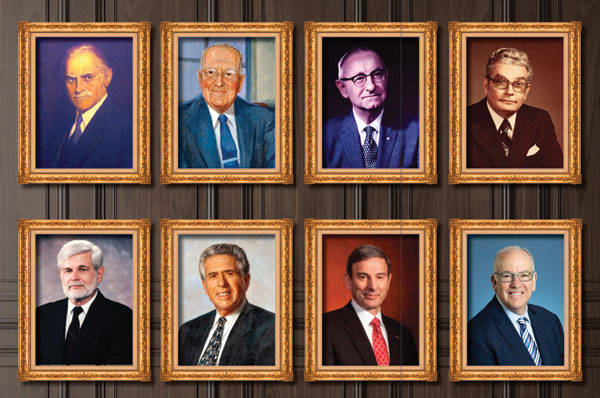 By Jennifer Schaffer Leone
By Jennifer Schaffer Leone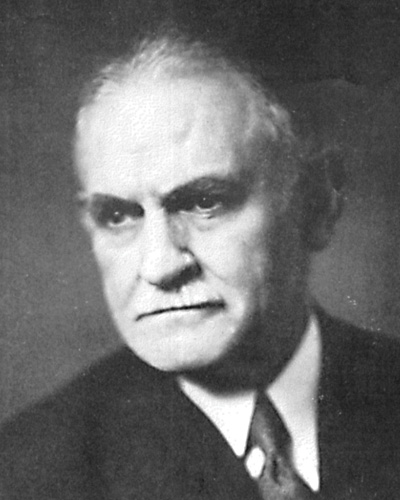 Oscar John Snyder, DO, began his early career as a teacher and then in federal government
service. He was drawn—later in life—to the study of osteopathic medicine when his
sister’s sight was restored after
Oscar John Snyder, DO, began his early career as a teacher and then in federal government
service. He was drawn—later in life—to the study of osteopathic medicine when his
sister’s sight was restored after 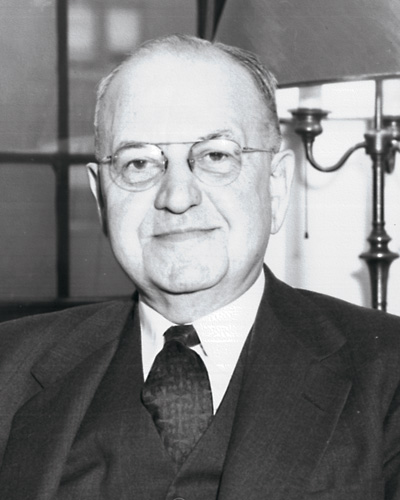 William E. Brandt, DO 1921, served as the College’s second president following a nearly
50-year period (1904 to 1953) during which the College’s board of chairmen directed
the growth of the institution. He was named acting president following the consolidation
of the College and hospital into a single corporation, the Philadelphia College of
Osteopathy (PCO), in 1952, and fully appointed to the office in 1953.
William E. Brandt, DO 1921, served as the College’s second president following a nearly
50-year period (1904 to 1953) during which the College’s board of chairmen directed
the growth of the institution. He was named acting president following the consolidation
of the College and hospital into a single corporation, the Philadelphia College of
Osteopathy (PCO), in 1952, and fully appointed to the office in 1953.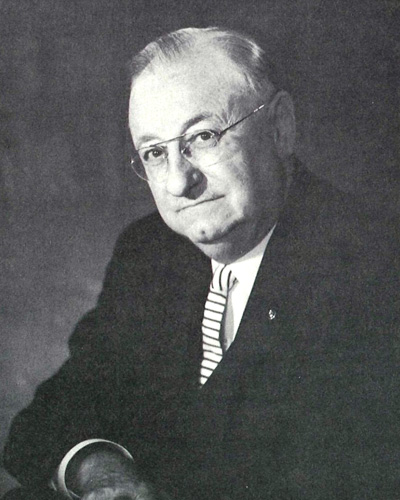 A businessman, civic leader and government servant, Frederic H. Barth, DSc (Hon.),
LLD (Hon.), devoted over a quarter of a century of active leadership to the College.
Born in Brooklyn, New York, Dr. Barth was a long-time resident of Philadelphia who
graduated from the Philadelphia College of Textiles and Science. He operated rubber
and hardware supply companies and held patents for textile equipment.
A businessman, civic leader and government servant, Frederic H. Barth, DSc (Hon.),
LLD (Hon.), devoted over a quarter of a century of active leadership to the College.
Born in Brooklyn, New York, Dr. Barth was a long-time resident of Philadelphia who
graduated from the Philadelphia College of Textiles and Science. He operated rubber
and hardware supply companies and held patents for textile equipment.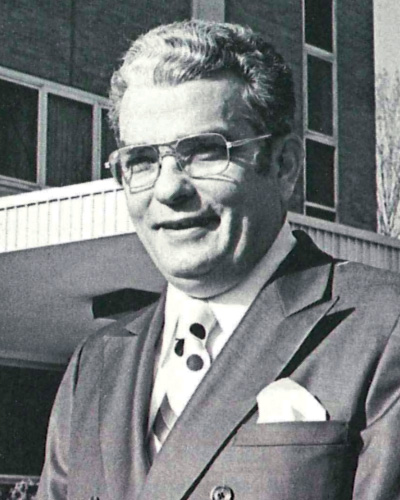 Thomas Mifflin Rowland, Jr., DO (Hon.), LLD (Hon.), DSc (Hon.), joined the College
staff in 1950, a veteran of World War II with service in the European Theater of Operations
with the 442nd Troop Carrier Command of the U.S. Army Air Forces. He was a graduate
of Temple University who had done postgraduate studies in public administration. He
progressively advanced through administrative posts at the College—assistant registrar,
registrar, director of admissions, administrative assistant to the president, vice
president for administrative affairs, and executive vice president—before becoming
PCOM’s youngest president at age 49, in 1974.
Thomas Mifflin Rowland, Jr., DO (Hon.), LLD (Hon.), DSc (Hon.), joined the College
staff in 1950, a veteran of World War II with service in the European Theater of Operations
with the 442nd Troop Carrier Command of the U.S. Army Air Forces. He was a graduate
of Temple University who had done postgraduate studies in public administration. He
progressively advanced through administrative posts at the College—assistant registrar,
registrar, director of admissions, administrative assistant to the president, vice
president for administrative affairs, and executive vice president—before becoming
PCOM’s youngest president at age 49, in 1974.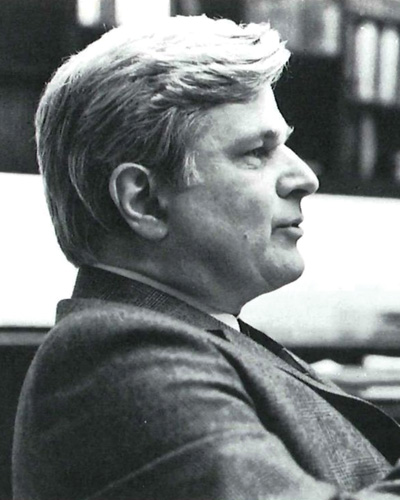 J. Peter Tilley, DO, MSe (Rad.), FAOCR, a radiologist with dual certification in nuclear
medicine, joined the College’s faculty in 1966 and served as vice chairman of radiology
and director of nuclear medicine. He was vice president of operational affairs and
chairman of the professional staff prior to his election as the fifth president of
PCOM in 1984.
J. Peter Tilley, DO, MSe (Rad.), FAOCR, a radiologist with dual certification in nuclear
medicine, joined the College’s faculty in 1966 and served as vice chairman of radiology
and director of nuclear medicine. He was vice president of operational affairs and
chairman of the professional staff prior to his election as the fifth president of
PCOM in 1984.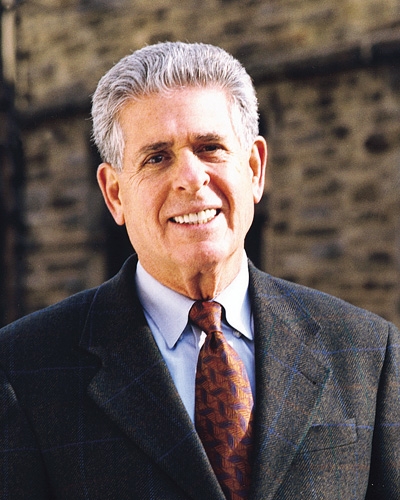 A former pharmacist, researcher and clinician in the field of urologic surgery, Leonard
H. Finkelstein, DO ’59, MSc ’63, FACOS, joined the PCOM faculty in 1970. In 1973,
he was named chairman of the Division of Urology and, in this capacity, advanced the
College’s urologic specialty and residency program.
A former pharmacist, researcher and clinician in the field of urologic surgery, Leonard
H. Finkelstein, DO ’59, MSc ’63, FACOS, joined the PCOM faculty in 1970. In 1973,
he was named chairman of the Division of Urology and, in this capacity, advanced the
College’s urologic specialty and residency program.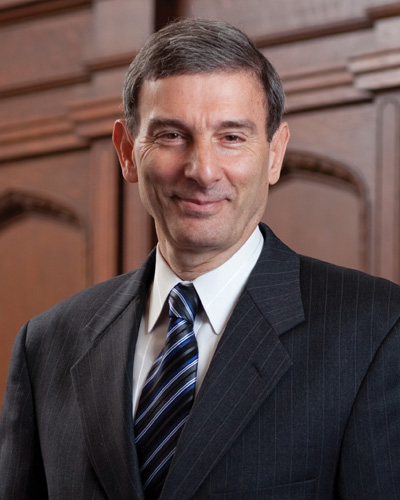 Matthew Schure, PhD, was installed as the College’s seventh president and chief executive
officer in 2000. Prior to his post at PCOM, he spent 30 years at New York Institute
of Technology (NYIT), an institution founded by his father. At NYIT, Dr. Schure served
as professor of behavioral sciences, associate dean for academic assessment and chair
of the department of community medicine; he was appointed president and chief executive
officer in 1991.
Matthew Schure, PhD, was installed as the College’s seventh president and chief executive
officer in 2000. Prior to his post at PCOM, he spent 30 years at New York Institute
of Technology (NYIT), an institution founded by his father. At NYIT, Dr. Schure served
as professor of behavioral sciences, associate dean for academic assessment and chair
of the department of community medicine; he was appointed president and chief executive
officer in 1991.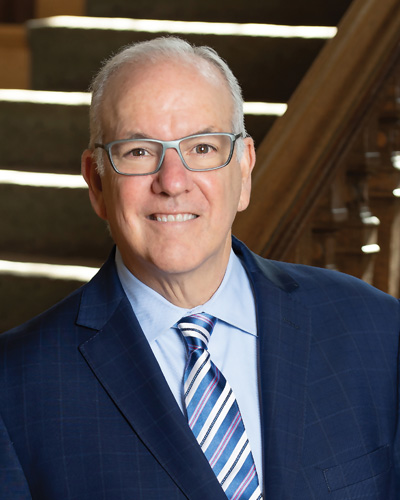 Jay S. Feldstein, DO ’81, was appointed the eighth president and chief executive officer
of the College in 2014, bringing to the post leadership acumen in healthcare management
and patient care. Board-certified in occupational medicine and a fellow of the American
College of Preventive Medicine, Dr. Feldstein previously served as president of the
Northern Division, Pennsylvania Managed Care Plans, and as corporate chief medical
officer/senior vice president and chief medical officer/senior vice president, medical
affairs, at AmeriHealth Caritas. He also held executive positions at Aetna, Concentra
Health Center, Occupational Health Resources, Inc., and Spectracare Occupational Health
Services.
Jay S. Feldstein, DO ’81, was appointed the eighth president and chief executive officer
of the College in 2014, bringing to the post leadership acumen in healthcare management
and patient care. Board-certified in occupational medicine and a fellow of the American
College of Preventive Medicine, Dr. Feldstein previously served as president of the
Northern Division, Pennsylvania Managed Care Plans, and as corporate chief medical
officer/senior vice president and chief medical officer/senior vice president, medical
affairs, at AmeriHealth Caritas. He also held executive positions at Aetna, Concentra
Health Center, Occupational Health Resources, Inc., and Spectracare Occupational Health
Services.